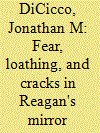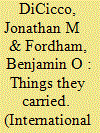|
|
|
Sort Order |
|
|
|
Items / Page
|
|
|
|
|
|
|
| Srl | Item |
| 1 |
ID:
106270


|
|
|
|
|
| Publication |
2011.
|
| Summary/Abstract |
Investigation into an often-overlooked Cold War episode reveals a tipping point in the Reagan administration's approach to the Soviet Union. In November 1983, NATO military exercise "Able Archer 83" reportedly touched off a crisis atmosphere among Soviet officials who feared a surprise nuclear attack. Intelligence reports about the war scare startled US President Ronald Reagan, altering his understanding of Soviet threat perceptions and prompting him to embrace his moderate advisers' recommendations that the administration take a more conciliatory approach toward the country Reagan had earlier labeled the "evil empire." By highlighting Soviet fears of the United States, intelligence stemming from Able Archer 83 cracked Reagan's mirror images and catalyzed a policy shift from hostile confrontation toward cautious cooperation. The case study identifies facilitating conditions for the shift and yields counterintuitive insights relating to international crises, perception and misperception, and the domestic politics of rivalry.
|
|
|
|
|
|
|
|
|
|
|
|
|
|
|
|
| 2 |
ID:
136168


|
|
|
|
|
| Summary/Abstract |
National Security Council is a real-time, semester-long simulation of the senior advisory group to the US President on national security and foreign policy. The simulation requires undergraduate students to role-play policymakers charged with long-range security planning and responding to actual events and crises as they happen. Students are encouraged to exercise their own judgment, but must operate within the political, bureaucratic, and organizational confines of the office (for example, Secretary of State, Chairman of the Joint Chiefs of Staff, etc.). Students conduct briefings, develop initiatives, and debate policy positions and proposals. Weekly meetings are supplemented with occasional special sessions to deal with real-world developments (for example, Arab Spring protests, military crisis with North Korea, major humanitarian emergency). The simulation course promotes accountability, independent and team learning, and oral communications skills, and forces students to grapple with bureaucratic turf battles, time pressure, and rapidly changing real-world situations. Several iterations between 2007 and 2012 yield insights into best practices for pedagogy and assessment, but also raise questions about the appropriate roles of technology, social networking, and the Internet.
|
|
|
|
|
|
|
|
|
|
|
|
|
|
|
|
| 3 |
ID:
158691


|
|
|
|
|
| Summary/Abstract |
Do foreign policy elites who shared formative political experiences also share similar views on subsequent policy issues? Proponents of a generation effect suggest that they do, but this argument overlooks two facts: (1) not everyone experiences major historical events in the same way and (2) different experiences might give rise to quite different policy views. Here we investigate the impact of the Vietnam War on elite opinion about foreign policy during the following two decades using elite surveys conducted by the Foreign Policy Leadership Project (FPLP) from 1976 through 1996, assessing their susceptibility to what has been called the Vietnam Syndrome. Not surprisingly, we find that age and military service influenced elite opinion about the Vietnam War. More importantly, we find that different trajectories of opinion about the Vietnam War influenced later views about a wide range of foreign policy issues during the Cold War, even after controlling for party identification and ideology. However, we see little evidence that these effects persisted after the end of the Cold War. This finding holds even on matters like civil war intervention, for which we might expect the experience of the Vietnam War to remain relevant. Our analysis suggests that the Vietnam Syndrome is restricted to matters involving Cold War rivalry.
|
|
|
|
|
|
|
|
|
|
|
|
|
|
|
|
|
|
|
|
|